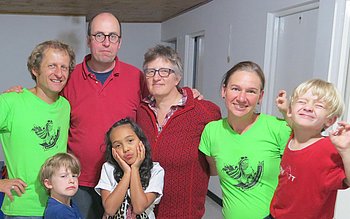The end of a service contract doesn’t mean the end of the relationship.

Susanne Brenner
Susanne Brenner-Büker and her husband (centre) with their successors in the project in Colombia, the Moresino-Zipper family.
“mitmenschen” (“fellow human beings” or “with people”) is the motto of the Association for Development Cooperation (AGEH). For eight years we journeyed together with people in Colombia, where we were involved in various peace processes, urban community work, and organisational development projects. We developed especially close relationships with the small Christian communities in the south of Bogotá. But other personal friendships developed as well through all the comings and goings of daily life and work during that time. That's why the separation from people, with whom we had shared joy and suffering in a violent society for several years, hit us hard.
Only now that we’ve learnt that relationships can be maintained at a distance, do I find the separation, which inevitably follows a limited term of development service, less painful. Thanks to email, WhatsApp & Co, our friendships with Colombians live on. The frequency of our contacts varies: sometimes several times a week and then rather less often at other times. Over the years, we’ve noticed that emails are often too much of an effort for everyone involved. But the community centre's Facebook page keeps us up to date. And WhatsApp has proved its worth as a way of sharing bits of information and special moments: An amusing photo of the cookery class at the community centre in Bogotá can be exchanged for a photo of a walk in the snow, for example. But we don't get to know anywhere near everything that’s going on in Bogotá or in our friends' families. Nor do we ourselves share everything that's preoccupying us at the moment.
We have had to invest time and energy in coming back to Germany and in daily life here: finding a home, working, building and maintaining a new circle of friends. We looked forward to our first visit to Colombia more than a year after our departure with some apprehension: What will it be like to meet each other again? Have we become strangers? But it very soon became clear that we were still familiar friends and we simply carried on our conversations.
For a while after we returned to Germany, we were invited to participate – from a distance – in discussions about the future development of the project. But before our successors arrived in post, we explained to the project manager that we no longer wished to voice an opinion on strategic issues, because these needed to be discussed with the new people. Our successors didn’t start work until twenty months after we had left. We supported them with information and advice before they left for Colombia – and afterwards, if we were asked to. But we didn’t travel again to Colombia until our successors had been in post for two years and expressly invited us to visit.
Relationships live on and change; They don’t end when a contract ends. Now we are hoping that the coordination team of the community centre will have an opportunity to travel to Germany and Switzerland in the summer of 2018. We’re already looking forward to accompanying at least four of our friends, when they visit partner organisations, and to organising meetings to discuss the ways in which Germany and the rest of the world are interconnected, and to showing our friends something of our home country. This will be a token of our gratitude for the many years of hospitality which we enjoyed.
Susanne Brenner lived in Columbia from 2005 to 2012 (published in transfer volume 1/2017)
